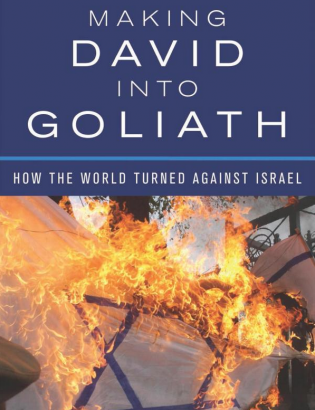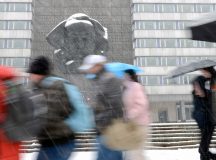700 British artists have announced that they are boycotting Israel until the ‘colonial oppression of Palestinians’ ends. In an open letter to the Guardian, the signatories explained that they will not accept ‘professional invitations to Israel, nor funding, from any institutions linked to its government.’
The Student Council at South Africa’s Durban University of Technology have called on the school’s authorities to expel its Jewish students. The school’s vice chancellor rejected the demand for a Judenfrei campus as ‘totally unacceptable.’
Last September, the annual conference of the British Trades Union Congress, historically a bastion of moderation in the international labour movement, passed the most anti-Israel resolution in its history. As labour activist Eric Lee noted, the resolution called on member unions to affiliate to the pro-Hamas Palestine Solidarity Campaign (PSC), which opposes the TUC’s own support for a two-state solution.
Over the past few months, a European Union (EU) court ruled that Hamas is not a terrorist organisation, while an international court in Geneva began hearing evidence of Israeli human rights violations and the British House of Commons joined several European governments in endorsing Palestinian statehood. A number of European cities were declared ‘Israeli-frei’ – free of Israeli goods – reflecting the success of the boycott, divestment, and sanctions (BDS) movement amongst academics, trade unions, students, human rights groups and churches across Europe and – to a much lesser extent – the United States.
‘Israel is losing Europe on three levels,’ Israeli analyst and pollster Dahlia Scheindlin told The New York Times. ‘Public opinion has shifted decidedly against Israel in most E.U. countries, the E.U. itself is increasingly thinking about and implementing policies against Israel’s presence in the West Bank, and, most recently, the waves of parliamentary discussions and votes in favor of recognising Palestinian statehood.’
In 2014, the UN General Assembly subjected Israel to 20 condemnatory resolutions, compared to only three for the rest of the world combined – one each on Iran, Syria and North Korea. Confirming Israel’s status as a political piñata, the UN Human Rights Council has maintained its efforts to ‘aid and abet a global culture of demonising the Jewish state,’ said the Geneva-based human rights group UN Watch.
A German judge recently ruled that three Palestinians convicted of arson after firebombing a synagogue in Wuppertal were not guilty of anti-Semitism, but simply sought to draw ‘attention to the Gaza conflict.’ Several days prior to the arson attack, ‘Free Palestine’ had been spray-painted on to the wall of the synagogue, which had been rebuilt after being destroyed in the Kristallnacht pogrom of 1938.
But a BBC reporter’s interview with a Jewish woman at the Paris rally following the Charlie Hebdo attacks suggests that anti-Semitism and anti-Zionism are not so easily detached. ‘We have to not to be afraid to say that the Jews, they are the target now,’ said the woman, identified as Chava, a daughter of Polish Holocaust survivors, comparing her feeling of insecurity to the situation in Europe in the 1930s. ‘Many critics, though, of Israel’s policy would suggest that the Palestinians suffered hugely at Jewish hands as well,’ interjected the BBC interviewer, Tom Willcox, explicitly linking resurgent anti-Semitism with what he called Palestinian suffering ‘at Jewish hands.’ When Chava objected to Willcox conflating the two, he replied: ‘But you understand, everything is seen from different perspectives?’ The encounter is illuminating not only for the conflation of anti-Semitism and anti-Zionism, but the display of moral equivalence and relativism – both implied and explicit.
One of the many virtues of Joshua Muravchik’s Making David Into Goliath: How the World Turned Against Israel (full disclosure: I am cited in the book as one of the author’s conversational sources) is that he refuses to privilege anti-Semitism as a driving factor of anti-Zionist animus. His rigorous and well-researched book explains why so many in the West no longer view Israeli as the plucky democratic underdog surrounded by hostile Arab autocracies and eliminationist non-state actors, but as a despicable outlier, morally equivalent to South Africa’s apartheid regime. A scholar at Johns Hopkins University’s School of Advanced International Studies, Muravchik warns that this ‘relentless campaign to recast “Israel” as a malevolent Goliath places it in great peril.’
This campaign is perverse because it aligns Western liberal elites with some of the world’s most illiberal forces in an attack upon a state which – as detailed in Muravchik’s recent e-book, Liberal Oasis: The Truth About Israel – is the only state in its neighbourhood ranked ‘free’ by Freedom House; that guarantees civil liberties and religious pluralism for an increasingly diverse citizenry; that has accommodated more refugees and immigrants relative to its size than any other country; that allowed gays to serve openly in the armed forces even before the US instituted (then revoked) ‘Don’t Ask Don’t Tell’; and that has the world’s second highest percentage of homes with solar-powered heating. Citing former French ambassador to the UK Daniel Bernard’s 2001 description of ‘that shitty little country,’ Muravchik notes that Israel is on course to exceed French GDP per capita, leads it in health and education standards, as well as Nobel Prizes, in patented inventions per capita, and in absolute numbers of chess grandmasters, amongst other criteria. The 2012 report of the UN Human Development Program ranks France 20th among the world’s nations, behind Israel at 16th. In short, the country’s record is ‘downright overwhelming,’ Muravchik notes, when measured against the ‘values … that Israel’s leftist and liberal detractors claim to hold dear.’
Prior to the Six-Day War of 1967 Israel was seen as tiny, beleaguered and was ‘widely admired for its resolution “never again” to allow Jews to be targeted,’ Muravchik notes. He recalls how the Western left – from liberals like Lionel Trilling, Ralph Ellison, and Martin Luther King to fellow-travelling progressives like Pablo Picasso and Jean-Paul Sartre – was enthusiastically supportive, never more so than during the 1967 Six-Day War, when 3,700 intellectuals wrote an open letter to the New York Times demanding US militarily intervention to save the Jewish state. But after Israel’s stunning victory, the ‘Arab-Israeli conflict’ morphed into the ‘Israeli-Palestinian conflict’ as the prevailing narrative shifted from 21 hostile states vs. a single vulnerable democracy to one of a neo-colonial power occupying and oppressing a downcast, disenfranchised, stateless people. David was recast as Goliath, and ‘the “global community” stamped Israel as an outcast.’
How did this volte-face come about? Muravchik’s explanation is admirably multi-faceted, highlighting the role of terrorism, European pusillanimity in the face of it, the Orientalist shift within academia, and Israel’s own mistakes, including the Lebanon War and failure to curb settlements. ‘These two forms of suasion – on the one hand, the raw power in Muslim numbers and Arab oil wealth, and, on the other hand, the moral claims of the Palestinians and the latter-day ideology of the Left – were to some degree contradictory, but in practice they reinforced each other.’
There took place an astute strategic reframing of the conflict on the part of the Palestinian leadership and its Arab state sponsors. In what was less a public relations campaign than a sustained ideological offensive, the Palestine Liberation Organisation (PLO) and its allies engineered a semantic shift to take advantage of the Western left’s post-’68 disillusion with the industrial working class as the bearer of its utopian fantasies and its corresponding infatuation with anti-imperialist Third World national liberation movements. The shift is all the more remarkable given that Palestinian nationalism had always owed more to the reactionary right than the progressive left.
Not only was Haj Amin al-Husseini, the Grand Mufti of Jerusalem and the father of modern Palestinian nationalism, openly allied with the Nazis while based in Berlin during the Second World War; he also served as one of many conduits for Nazi ideology to infect post-war Arab politics, as Jeffrey Herf’s Nazi Propaganda for the Arab World has detailed. More recently, David Motadel’s Islam and Nazi Germany’s War notes that while Muslims fought on both sides of the war, Nazism was one ‘of the most vigorous attempts to politicise and instrumentalise Islam in modern history.’ The Mufti’s legacy, evident in the hostility of Arab states to Israel and the alacrity with which they gave refuge and employment to so many exiled Nazis, inevitably shaped the politics of his cousin, Mohammed Abdul Raouf al-Qudwa al-Husseini, otherwise known as Yasser Arafat.
Arafat’s Fatah drew on the new Third Worldist discourse to court the Western left and secure the patronage of ‘progressive’ states as China, North Vietnam, Cuba, the USSR and the rest of the Soviet bloc. ‘The struggle of the Palestinian people, like that of the Vietnamese people and other peoples of Asia, Africa and Latin America, is part of the historic process of the liberation of the oppressed peoples from colonialism and imperialism,’ Fatah’s leadership stated in 1969. The Palestinians were able to draw on the considerable economic resources of Arab petro-states, especially following the 1973 oil price hike, and the resulting boost in the diplomatic heft and leverage of those states – culminating in the infamous ‘Zionism is racism’ resolution at the UN General Assembly – while at the same time claiming the mantle of the downtrodden, becoming ‘the comrades of such chic, romanticised figures as Ho Chi Minh and Che Guevara.’
Once, the Left embraced Israel as the embodiment of its own principles; a bastion of democracy and liberal values, with a large and vibrant labour movement, a quasi-collectivist economy and one of the world’s first female heads of state. But Israel was abandoned once the Left embraced a new paradigm of progressive thought defined by ‘multiculturalism or race-consciousness’ within which ‘the struggle of the third world against the West, or of “people of color” against the white man, replaced the older Marxist model of proletariat versus bourgeoisie as the central moral drama of world history.’ This new paradigm enabled the Palestinians and their allies to embark upon a Gramscian long march through the institutions of the Left in the 1970s and 1980s.
The European left was especially vulnerable. Muravchik describes how Austria’s Social Democratic Chancellor Bruno Kreisky emerged as one of the ‘foremost leaders in undoing Europe’s sympathy for Israel and its people.’ Kriesky facilitated the PLO’s elevation into the ranks of the politically respectable, despite or, rather, because of its orchestration of terrorist attacks across the continent. Terrorism, ironically, cemented the PLO’s legitimacy. Dozens of airline hijackings and airport attacks from the late 1960s to the early 1970s, highlighted the fragility and timidity of European leaders who consistently capitulated to Palestinian demands. They released recently convicted terrorists, often after negotiating assurances that their country would not be targeted in future. (The Palestinians rewarded their appeasers by training and equipping urban terrorist groups like Germany’s Baader-Meinhof gang, or Red Army Faction. A recent exhibition on the Red Army Faction at Berlin’s Historical Museum featured documentation confirming that the Germans attended training camps run not by the more radical Palestinian factions, but by Fatah.)
The 1973 Arab oil embargo also prompted the European Economic Community (the precursor to the EU) to adopt wholesale the Arab League position of demanding Israel’s full and unconditional withdrawal from territory occupied in 1967 – without the negotiations or border adjustments required by UN Security Council resolution 242, and without asking the Arab states to recognise or make peace with Israel.
But Europe’s most egregious and craven capitulation to the power of Arab oil came during the 1973 Yom Kippur War when a surprise attack by the Egyptian and Syrian armies initially routed ill-equipped Israeli forces. As the Soviets rushed supplies to their allies, Muravchik recounts, the UK and France responded to the threat of retaliation by Arab oil states through imposing an arms embargo on Israel, while West Germany stopped the transfer of arms from US bases on its territory. The US prepared a massive airlift, but faced a problem; American C-141 and C-5 transport planes could not fly non-stop to Israel. Not a single NATO member state would allow US aircraft to refuel or even fly over their territory. It was only when Kissinger strong-armed Caetano’s Portugal – which had no diplomatic relations with Israel – that the Jewish state could be re-supplied and saved.
Far from the high politics of international diplomacy, Israel’s detractors were also making headway in the struggle to win hearts and minds for the Palestinian cause amongst the next generation of opinion-formers and decision-makers. And nobody played a more influential role in this than Columbia University professor Edward Said who redefined Zionism as ‘a movement of white people competing for land with people of color,’ Muravchik writes. Said’s hugely influential critique of Orientalism ‘rolled American racism and European colonialism into one ball of wax: white oppression of darker-skinned peoples.’
That Said’s thesis on Orientalism has been thoroughly discredited by more rigorous academic analysis is less significant than its emotional appeal to the post-colonial guilt of those people Pascal Bruckner calls ‘self-flagellants of the Western world.’ With the adoption of the orientalist myth by Western elites, the very ‘otherness’ of Israel’s Arab attackers recast them as victims instead of victimisers which ‘meant that from then on the Left would be aligned overwhelmingly and ardently against Israel.’
With the Israeli and Zionist narrative thus reframed ‘from a redemptive refuge from two thousand years of persecution to the very embodiment of white supremacy,’ the Left’s alienation from Israel was aggravated when Israeli voters had the temerity to depart from the assigned script and for the first time elect a right-wing government, bringing the Likud Party of Menachem Begin and Ariel Sharon to power in 1977. Showing judicious balance, in a chapter entitled ‘Israel Shows a Less Endearing Face,’ Muravchik faults the Likud for the aggressive expansion of settlements on the West Bank and, in a separate chapter, for the 1982 Lebanon War, which ‘culminated in an especially vicious episode, the massacre of non-combatants in the Palestinian refugee camps of Sabra and Shatilla.’ The Israeli military’s apparent complicity or indifference towards the war crimes committed by the Christian Phalangists was especially damaging to Israel’s international reputation, he states, even allowing for the ‘selective indignation’ that allows Israel’s detractors to ignore or minimise far greater atrocities in the region and beyond.
Although the Kahan Commission’s investigation of the massacre ‘partially rehabilitated Israel’s reputation … the harm done by the whole Lebanon venture was never fully repaired,’ says Muravchik. ‘Public opinion polls in the United States showed that support for Israel eventually returned to its pre-Lebanon War levels, but in Europe the recovery was only partial. The combined impact of Lebanon and Begin’s settlement-building campaign would become specters haunting Israel’s global standing.’
The Israeli government’s actions did more than feed anti-Israeli sentiment abroad. They spawned a new ‘adversary culture’ at home. ‘The harm to Israel’s reputation caused by Begin’s policies was multiplied many times over by the divisions they exacerbated within Israeli society,’ Muravchik argues. As the ‘new historians’ – including Benny Morris, Ilan Pappé and Avi Shlaim – began to undermine Israel’s legitimacy by challenging the conventional Zionist/Israeli narrative, a new generation of ‘critical sociologists,’ such as Oren Yiftachel, Haaretz journalists like Gideon Levy and Amira Hass, and human rights groups like B’Tselem, helped shape ‘a subculture of alienation that proved to be an inexhaustible resource for Israel’s enemies,’ not least by lending ‘an indigenous imprimatur to the most jaundiced interpretations of the country’s actions and motives.’ These developments coincided with the decline of Israel’s Labour Party and labour movement, as well as a global crisis of the Left. ‘The death of the socialist dream created a spiritual vacuum in Israel’ and it was filled by post-Zionism. ‘These alienated Israelis constitute an unmatched resource’ Muravchik notes, for the Israel-haters, for they offer a ‘trove of home-grown testimony that their country is guilty of every imaginable crime and sin.’
As powerful as Making David Into Goliath is in explaining Israel’s status as the pariah of both the Western secular-liberal left and the most regressive, illiberal, anti-democratic, misogynistic and homophobic forces in the Arab and wider Muslim world, I am still not sure that we get to what Harvard’s Ruth R. Wisse recently called ‘the heart of the matter.’
It would come as no surprise to me if we learnt from future historians that the PLO and its allies had studied very carefully how the Soviet Union seduced successive generations of Lenin’s ‘useful idiots’ or ‘me-too Communists,’ those whom the Comintern’s Willi Muntzenberg organised into his ‘Innocents’ Clubs’ of the morally committed but politically naïve.
As the revolutionary illusions of today’s Left dissipate and even its modest reformist projects recede, it finds solace in the Palestinians who are made to function as a screen onto which the Left projects its antipathy for the sordid West and its fascination with the esoteric, romanticised, victimised Other. Perhaps this story – best told by Paul Hollander in his book Political Pilgrims: Western Intellectuals in Search of the Good Society – is more about the Left than it is about Israel? How else to explain why so many Western progressives are not only implacably hostile to the Middle East’s only liberal democracy, but also deem Islamist terrorist groups to be ‘social movements that are progressive,’ as the anti-Zionist feminist theorist Judith Butler famously described Hamas and Hezbollah. In short, could it be that Israel is vilified in large part because it is a liberal haven in an illiberal desert, a country that has defeated successive efforts to destroy it by forces deemed ‘progressive’ because they are Other, but which are in fact utterly reactionary?
*
And what of America? Muravchik warns that the US will not remain immune from this European sickness. ‘Although the ideological Left may be small in numbers, it is able to exert influence with a much wider public by advancing its positions through groups that present themselves as liberal rather than radical: human rights organisations, labor unions, churches, and even Jewish groups like J Street.’
These were prescient words, for since his book went to press, members of the American Studies Association have voted by a ratio of more than two to one to endorse a boycott of Israeli academic institutions, a move described by The New York Times as ‘a milestone for a Palestinian movement known as B.D.S., for Boycotts, Divestment and Sanctions, which for the past decade had found little traction in the United States.’
Although members of the American Historical Association have since defeated a similar move, prominent Jewish figures of the academic left, including political theorist Michael Walzer of Princeton University, Columbia University sociologist Todd Gitlin, and political scientist Alan Wolfe of Boston University, did recently call for sanctions against ‘annexationist’ Israeli politicians. Their call was notable, as a commentary in The American Interest observed, for being so ‘dramatically one-sided; no parallel call to sanction Palestinian politicians who advocate a one-state solution has been heard, from this group of intellectuals or anyone else.’
The BDS campaign’s encroachment on US political terrain is all the more dismaying because ‘the anti-Israel camp does not need to win America fully to its side,’ he suggests. ‘Merely to neutralise it would radically alter the balance of power and put Israel in great jeopardy,’ even raising the prospect of ‘a second Holocaust.’
The celebrated strategist Edward N. Luttwak adopts a more sanguine perspective, in good part by taking the long view. He highlights the fate of those powerful, intimidating geo-political forces that have sought to deny or revoke Israel’s right to exist, from the Ottoman and British empires to the USSR and its Soviet bloc allies. ‘Looking back on the vast, abrupt, unpredicted, and amazingly rapid transformations of the world in which the Zionist project advanced over the last 100 years,’ he notes, ‘it is perfectly evident that the importance of “geopolitical realities” and “Great Power Politics,” and of the political preferences and Middle East priorities of the mighty of the earth – sultans, emperors, prime ministers, presidents, and Popes – were all of them very greatly overrated, at every remove, when compared to the growth of Israel’s villages, towns and cities, family by family, house by house.’
In truth the struggle between resilience and delegitimisation is undecided. What is certain is that Israel’s tenacity will not deter its detractors. Muravchik notes that the anti-Israel movement ‘is committed to the long war’ confident that ‘the relentless campaign to recast [Israel] … as a malevolent Goliath places it in grave peril.’





































Please give some time to reading this very thoughtful review